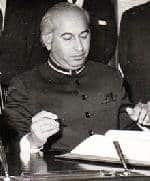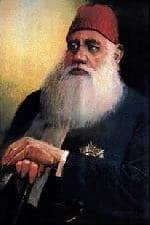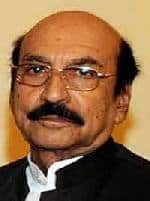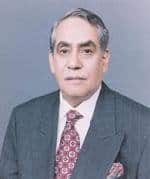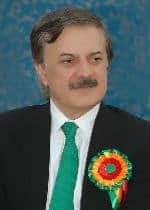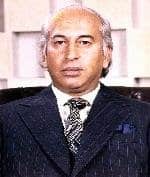
Zulfikar Ali Bhutto (January 5, 1928 – April 4, 1979) was a Pakistani politician who served as the President of Pakistan from 1971 to 1973 and as the Pakistan from 1973 to 1977. He was the founder of the Pakistan People’s Party (PPP), which is one of the largest political parties in Pakistan. His daughter Benazir Bhutto has also served twice as prime minister. Bhutto is often addressed as the Quaid-e-Awam .
Early Life
Zulfikar Ali Bhutto was born to Khursheed Begum nee Lakhi Bai and Sir Shah Nawaz Bhutto. He was born in a prominent Sindhi Shia Muslim Arain family. His mother converted from Hinduism to Islam before her marriage. Bhutto’s father was a prominent political figure in the Indian colonial government. Bhutto was born in his parent’s residence near Larkana in what later became the province of Sindh.
He was their third child — their first one, Sikandar Ali, died from pneumonia at age seven in 1914 and the second child, Imdad Ali, died of cirrhosis at the age of 39 in 1953. His father was a wealthy landlord, a zamindar, and a prominent politician in Sindh, His father was the prime minister of Junagadh State, who enjoyed an influential relationship with the officials of the British Raj. As a young boy, Bhutto moved to Worli Seaface in Bombay (now Mumbai) to study at the Cathedral and John Connon School.
During this period, he also became a student activist in the League’s Pakistan Movement. In 1943, his marriage was arranged with Shireen Amir Begum (died January 19, 2003 in Karachi). He later left her, however, in order to remarry. In 1947, Bhutto was admitted to the University of Southern California.
History and Background
Born in a wealthy and influential family, Bhutto became one of the youngest politicians in Pakistan when he entered the government led by President Ayub Khan. Bhutto rose quickly in power, serving as foreign minister and a close advisor to Ayub Khan during the Indo-Pakistani War of 1965. Falling out with Ayub after the war, Bhutto founded the Pakistan People’s Party, which won a majority of seats from West Pakistan in 1970. Bhutto refused to accept the victory of the Awami League, leading to a political and sectarian crisis. After the Bangladesh Liberation War, Bhutto took over as president and the first civilian chief martial law adminstrator of Pakistan. In this capacity, he negotiated the Shimla Agreement with Indian leader Indira Gandhi to establish peace.
Under Bhutto, Pakistan adopted a new constitution. Transferring to the post of prime minister, Bhutto nationalised many industries. Pioneering Islamic socialism in Pakistan, he undertook land redistribution and other socialist policies. Bhutto also ordered the Pakistan Army to suppress the insurgency in Balochistan and suppressed a military coup attempt in 1973. However, Bhutto became increasingly unpopular over allegations of corruption and suppression of political opponents. The boycott of the 1977 elections by opposition parties created a political crisis that ended when Bhutto was deposed by the army chief Gen. Muhammad Zia-ul-Haq. Despite a controversial trial and protests, he was executed.
Political Career
In 1957, Zulfikar Ali Bhutto became the youngest member of Pakistan’s delegation to the United Nations. He would address the United Nations Sixth Committee on Aggression on 25 October 1957 and lead Pakistan’s deputation to the first United Nations Conference on the Law of the Sea in 1958. In the same year, Bhutto became the youngest Pakistan cabinet minister when he was given charge of the Energy ministry by President Field Marshal Ayub Khan, who had seized power, through a successful coup d’état, and declared martial law in the country. In 1960, he was subsequently promoted to minister of the Commerce Ministry, and Ministry of Information and Industry Ministry.
Throughout this time, Bhutto became a close and trusted political advisor to Field Marshal Ayub Khan, rising in influence and power despite his youth and relative inexperience in politics. Bhutto aided Ayub Khan in negotiating the Indus Water Treaty in India in 1960. He is strongest. In 1961, Bhutto negotiated an oil exploration agreement with the Soviet Union, which also agreed to provide economic and technical aid to Pakistan.
Pakistan Peoples Party
Historic welcome in Lahore after leaving Ayub’s Cabinet as Foreign Minister, large crowds gathered to listen to Bhutto’s speech on 21 June 1967. Tapping a wave of anger and opposition against Ayub, Bhutto began travelling across the country to deliver political speeches. In a speech in October 1966 Bhutto declared manifesto of Pakistan Peoples Party , “Islam is our faith, democracy is our policy, socialism is our economy. All power to the people.” On 30 November 1967, in a residence of Dr. Mubashir Hassan, Bhutto, along with J.A. Rahim and Dr. Mubashir Hassan, founded the Pakistan Peoples Party (PPP) in Lahore, establishing a strong base of political support in Punjab, Sindh and amongst the Muhajir communities.
In the general elections held in December 1970, P. P. P. won a large majority in West Pakistan but failed to reach an agreement with Sheikh Mujib-ur-Rahman, the majority winner from East Pakistan. Following the 1971 War and the separation of East Pakistan, Yahya Khan resigned and Bhutto took over as President and Chief Martial Law Administrator on December 20, 1971.
President / Prime Minister of Pakistan
And sent a plane Airlines Pakistan International to bring Bhutto from New York, who was at that time was presenting the case of Pakistan before the Security Council of the United Nations to East Pakistan crisis. Bhutto returned home on 18 December 1971. On 20 December, he was transferred to the President House in Rawalpindi where he held positions of Yahya Khan, one Chairman and President of the first civilian director of martial law, and this is the first civilian president director of martial law to dismembered Pakistan.
The new president inherited a disillusioned nation weary of war. In this time the dark, her face to the nation on radio and television, said: “Sons of my dear, dear friends, and students, dear, the workers and peasants … those who fought for Pakistan … We are facing the worst crisis in the life of our country, a crisis of a deadly, We have to pick up the pieces, very small pieces, but we will not make the new Pakistan, a prosperous and progressive Pakistan. ” And placed under house arrest Yahya, brokered a cease-fire, and ordered the release of Sheikh Mujibur Rahman, who was held prisoner by the army. To implement this, Bhutto reversed the judgment of the Court of Mujibur Rahman trial that took place earlier, and who chaired the Dean Rahimuddin Khan (later General) had sentenced Mujib to death. Appointment of a new government, appointed Gen. Gul Hassan Bhutto, head of the Army Staff.
On January 2, 1972 Bhutto announced the nationalisation of all major industries, including iron and steel, heavy engineering, heavy electricals, petrochemicals, cement and public utilities. A new labour policy was announced increasing workers rights and the power of trade unions. Although he came from a feudal background himself, Bhutto announced reforms limiting land ownership and a government take-over of over a million acres (4,000 km²) to distribute to landless peasants. More than 2,000 civil servants were dismissed on charges of corruption. Bhutto also dismissed the military chiefs on March 3 after they refused orders to suppress a major police strike in Punjab. He appointed Gen. Tikka Khan as the new Chief of the Army Staff in March 1972 as he felt the General would not interfere in political matters and would concentrate on rehabilitating the Pakistan Army. Bhutto convened the National Assembly on April 14, rescinded martial law on April 21 and charged the legislators with writing a new constitution.
Father of the Nuclear weapons program
Zulfiqar Ali Bhutto was the founder of Pakistan’s nuclear weapons programme, and due to his administrative and aggressive leadership to lead this nuclear deterrence programme, Bhutto is often known as Father of Nuclear deterrence programme. In October 1965, as Foreign Minister, Zulfiqar Ali Bhutto visited Vienna when Munir Ahmad Khan informed him of the status of Indian nuclear programme and the options Pakistan had to develop its own nuclear capability. Both agreed on the need for Pakistan to develop a nuclear deterrent to meet India’s nuclear capacity. While, Munir Ahmad Khan had failed to convince Ayub Khan, Bhutto had said to Munir Ahmad Khan: Don’t worry, our turn will come. Shortly, after the 1965 war, Bhutto in a press conference, famously declared that “even if we have to eat grass, we will make nuclear bomb. We have no other choice.” as he saw India was making its way to develop the bomb.
Image and Praise
Bhutto’s international image was more of an Internationalist with a secular image. In spite of all the criticism—and subsequent media trials—Bhutto still remains the most popular leader of the country. Zulfikar Ali Bhutto Institute of Science and Technology is named for him; his daughter was chairman of its board of trustees. Under his democratic premiership, Bhutto was responsible for supervising the promulgation of Pakistan’s third 1973 constitution for which he successfully obtained approval from all of political parties in Pakistan. Because of his administrative and aggressive nature to lead the nuclear weapons programme, Bhutto, in the world, is often and commonly regarded as the Father of Pakistan’s nuclear deterrence programme, in spite of Pakistan’s limited financial resources and strong opposition from other countries, particularly the United States.
In order to retrieve 93,000 P.O.Ws held in India and to avoid another major conflict, Bhutto held peace talks with arch-rival neighbor India and successfully signed Simla Agreement with Indira Gandhi, Premier of India during this time period. In 2006, while globally publishing the article, “The Wrath of Khan”, The Atlantic described Bhutto as demagogic and extremely populist, but Pakistan’s greatest civilian leader. Whereas, the Bombay Times referred to Bhutto as “genius” and “person with brilliant manner”. Despite Henry Kissinger developed differences with Bhutto and his colleagues, Kissinger could not hide his expression in 1979 when he quoted Bhutto as “brilliant, charming, of global stature in his perception”.
While, Bhutto’s former Law Minister Mairaj Muhammad Khan described Bhutto as “a great man but cruel”. His family remained active and influential in politics, with first his wife and then his daughter becoming leader of the PPP political party. His eldest daughter, Benazir Bhutto, was twice Prime minister of Pakistan, and was assassinated on 27 December 2007, while campaigning for 2008 elections. While his son, Murtaza Bhutto, served as the Member Parliament of Pakistan, and was also assassinated in a controversial police encounter. With all the criticism and opposition, Bhutto remained highly influential and respected figure even after his death. In 2011, in a gallop survey managed and taken by Dawn Newspapers, Bhutto was voted and listed as Pakistan’s one of the few greatest leader, and came in second place while Jinnah— Pakistan’s founder— listed and voted in first place. Bhutto is widely regarded as being among the most influential men in the history of Pakistan. His supporters gave him the title Quaid-e-Awam (Leader of the people).
Current Status
Zulfikar Ali Bhutto remains a controversial figure in Pakistan. He is criticised not for opportunism, corruption, nepotism and intimidating his political opponents. His socialist policies are blamed for slowing down Pakistan’s economic progress owing to unproductivity, high costs and corruption. Bhutto is also criticised for major human rights abuses and ethnic cleansing perpretrated by the army in Balochistan.[ Many in Pakistan’s military, notably the current president Gen. Pervez Musharraf condemn Bhutto for having caused the crisis that led to the creation of Bangladesh. Bhutto’s supporters and proponents assert that he fought against military hegemony and restored democracy to Pakistan. Bhutto’s socialist policies promoted social welfare, alleviation of poverty and expanding ownership of land and capital beyond a small number of feudal and industrial families.[7] Bhutto’s action against insurgency in Balochistan is credited for preserving the unity of Pakistan after the 1971 war. Supporters assert that Bhutto was overthrown as a result of his refusal to accept the army’s influence and interference in politics and policy.
Often referred to with respect and Bhutto Shaheed (martyr), or with the title of Honorary Commander-mail Floater. Bhutto and his family are still popular on a large scale in many parts of Pakistan, especially in Sindh. Bhutto was the namesake of many public institutions in Pakistan. Benazir Bhutto succeeded her mother as leader of the PPP and the pro-democracy opposition to the regime of President Zia ul-Haq. In the elections held after the death of Zia ul-Haq in 1988, Bhutto led the Pakistan People’s Party to win, and became the first female leader of the Islamic nation, despite the government’s refusal in 1990. Bhutto won re-election in 1993 but was sacked again in 1996. He was convicted of her husband Asif Ali Zardari after the conspiracy to kill Murtaza Bhutto, brother in 1993. In London when he was ousted Prime Minister Nawaz Sharif by General Musharraf in 1999, has been denied since Benazir Bhutto of Pakistan, and is legally barred from contesting the elections. Zulfikar Ali Bhutto is still a symbol of the Pakistan People’s Party and one of the most influential Pakistani politicians in history.
Zulfikar Ali Bhutto Pictures
|
|
|
| ||||||||


